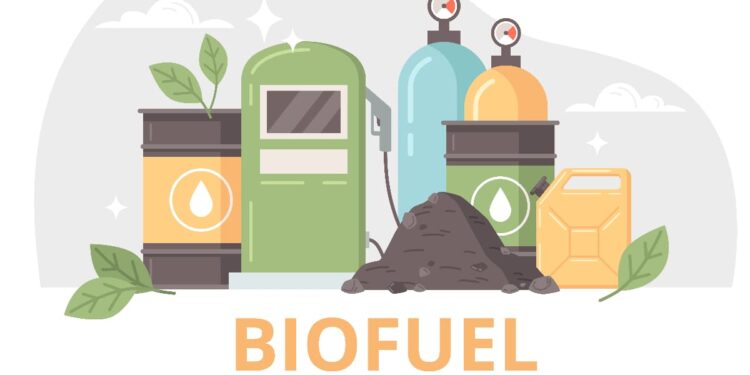Contents
Introduction
In an era where sustainability and environmental consciousness have taken center stage, biofuels have emerged as a promising solution to reduce our dependence on fossil fuels and mitigate the adverse impacts of climate change. This article delves into the fascinating world of biofuels, exploring what they are, how they are produced, their benefits, and their role in shaping a greener tomorrow.
What is Biofuel?
Biofuel is a renewable energy source derived from organic materials. Unlike conventional fossil fuels that release harmful greenhouse gases when burned, biofuels are considered environmentally friendly alternatives. They are produced from various biological sources, such as crops, agricultural waste, and even algae. The beauty of biofuels lies in their ability to offer energy without detrimental effects on the planet.
Examples of Biofuels
Several examples of biofuels exist, each hailing from distinct sources. Common examples include:
- Biodiesel: Derived from vegetable oils or animal fats, biodiesel is a clean-burning alternative to traditional diesel fuel.
- Ethanol: Produced from crops like corn, sugarcane, and even cellulosic materials, ethanol is commonly blended with gasoline to reduce carbon emissions.
- Biogas: Generated from the anaerobic decomposition of organic waste, biogas can be used for heating, electricity generation, and even as vehicle fuel.
- Algal Biofuel: Algae’s rapid growth rate and oil content make it a promising candidate for biofuel production, offering a potentially more sustainable source.
- Bioethanol: Similar to ethanol, bioethanol is made from the fermentation of sugars present in various plant materials.
Five Types of Biofuel
There are five main types of biofuels, each with its unique production process and potential:
- First-Generation Biofuels: These are produced from edible crops like corn, sugarcane, and vegetable oils.
- Second-Generation Bio Fuels: Derived from non-edible plant materials and agricultural residues, these bio Fuels minimize the ethical concerns surrounding food crops.
- Third-Generation Bio Fuels: Algae-based bio fuels are considered third-generation. Algae can thrive in diverse environments and produce significant oil yields.
- Fourth-Generation Bio Fuels: These futuristic bio fuels focus on genetic engineering to enhance the oil content of plants specifically grown for fuel production.
- Fifth-Generation Bio Fuels: The cutting-edge of bio fuel technology, fifth-generation bio fuels involve synthetic biology to engineer microorganisms capable of directly producing fuel compounds.
How Biofuels Are Made?
Bio fuel production involves intricate processes that vary depending on the type of bio fuel being produced. Generally, bio fuels are created through fermentation, chemical conversion, or a combination of these methods. For instance, biodiesel is typically produced by reacting vegetable oils or animal fats with alcohol in a process known as transesterification.
Is Biofuel a Petrol?
No, bio fuel is not the same as petrol. While both are used to power vehicles, petrol is a fossil fuel derived from crude oil. Bio fuels, on the other hand, are renewable alternatives made from living organisms or their byproducts.
The Main Source of Biofuels
The primary sources of bio fuels are agricultural products and waste, along with non-food crops such as algae and woody biomass. These resources can be sustainably grown and harvested, reducing the strain on natural ecosystems.
The Main Uses of Biofuels
Bio fuels are incredibly versatile and find applications across various sectors:
- Transportation: Bio fuels can be blended with gasoline or diesel to power vehicles, reducing emissions and promoting cleaner air quality.
- Electricity Generation: Biogas and bioethanol can be burned to produce electricity, providing a renewable energy source for homes and industries.
- Heating: Biogas can serve as a source of heat for cooking and heating in residential and commercial spaces.
Benefits of Biofuels
Bio fuels offer numerous advantages that contribute to a sustainable future:
- Reduced Greenhouse Gas Emissions: Bio fuels produce fewer carbon emissions compared to fossil fuels, helping to mitigate climate change.
- Renewable and Sustainable: Unlike finite fossil fuels, bio fuels can be continuously produced from organic materials, making them a renewable energy source.
The Pioneers of Biofuel
The concept of bio fuels dates back to the early 20th century, but the term gained prominence during the oil crises of the 1970s. Rudolf Diesel, the inventor of the diesel engine, experimented with peanut oil as a potential fuel source. However, it was only later that researchers and scientists like Dr. Geoffrey Brooks and Dr. Shigetaka Kumagai made significant strides in the field of bio fuel research.
Conclusion
In a world striving for cleaner energy solutions, bio fuels stand as a beacon of hope. From their various types to their production processes and numerous applications, bio fuels offer a greener alternative to conventional fossil fuels. As technology advances and research continues, the potential of bio fuels to reshape our energy landscape and combat climate change becomes even more evident. As we look to the future, embracing bio fuels could lead us toward a more sustainable and environmentally harmonious tomorrow.
Recommended:













